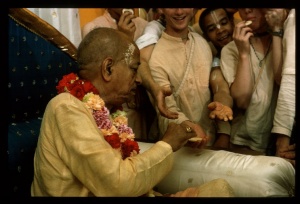CC Madhya 21.125 (1975)

A.C. Bhaktivedanta Swami Prabhupada
Below is the 1996 edition text, ready to be substituted with the 1975 one using the compile form.
TEXT 125
- kāma-gāyatrī-mantra-rūpa, haya kṛṣṇera svarūpa,
- sārdha-cabbiśa akṣara tāra haya
- se akṣara ‘candra’ haya, kṛṣṇe kari’ udaya,
- trijagat kailā kāmamaya
SYNONYMS
kāma-gāyatrī-mantra-rūpa—the hymn known as Kāma-gāyatrī; haya—is; kṛṣṇera svarūpa—identical with Kṛṣṇa; sārdha-cabbiśa—twenty-four and a half; akṣara—syllables; tāra—of that; haya—are; se akṣara—these syllables; candra haya—are like the moon; kṛṣṇe—Lord Kṛṣṇa; kari’ udaya—awakening; tri-jagat—the three worlds; kailā—made; kāma-maya—full of desire.
TRANSLATION
“Kṛṣṇa, the Supreme Personality of Godhead, is identical with the Vedic hymn known as the Kāma-gāyatrī, which is composed of twenty-four and a half syllables. Those syllables are compared to moons that arise in Kṛṣṇa. Thus all three worlds are filled with desire.